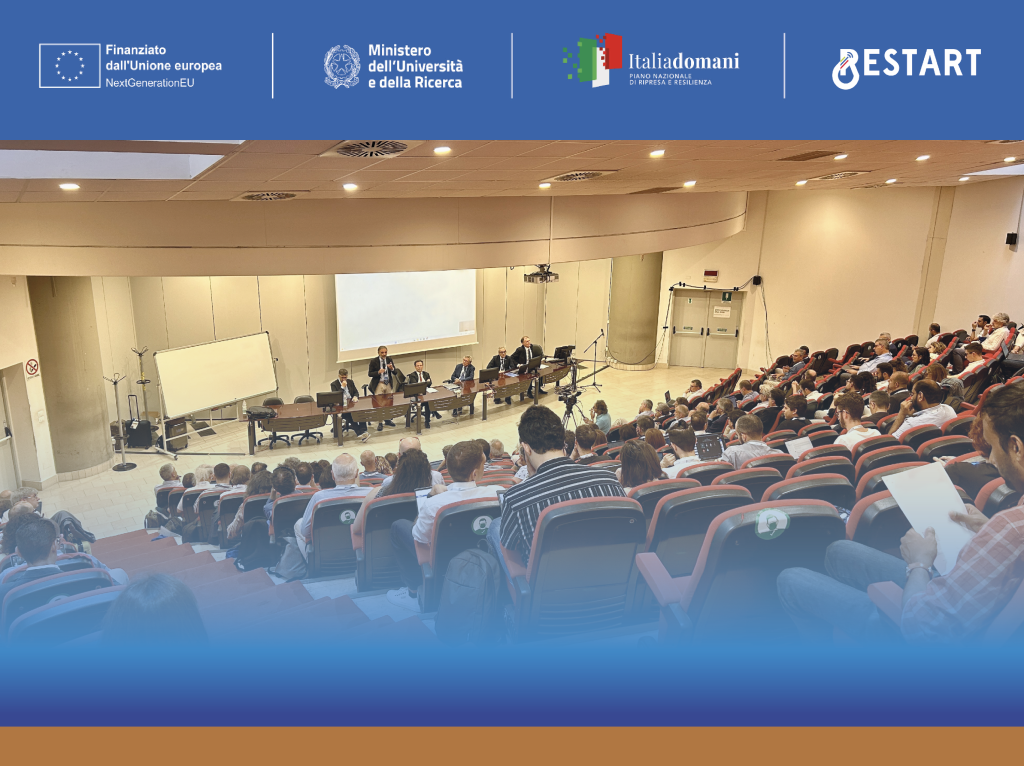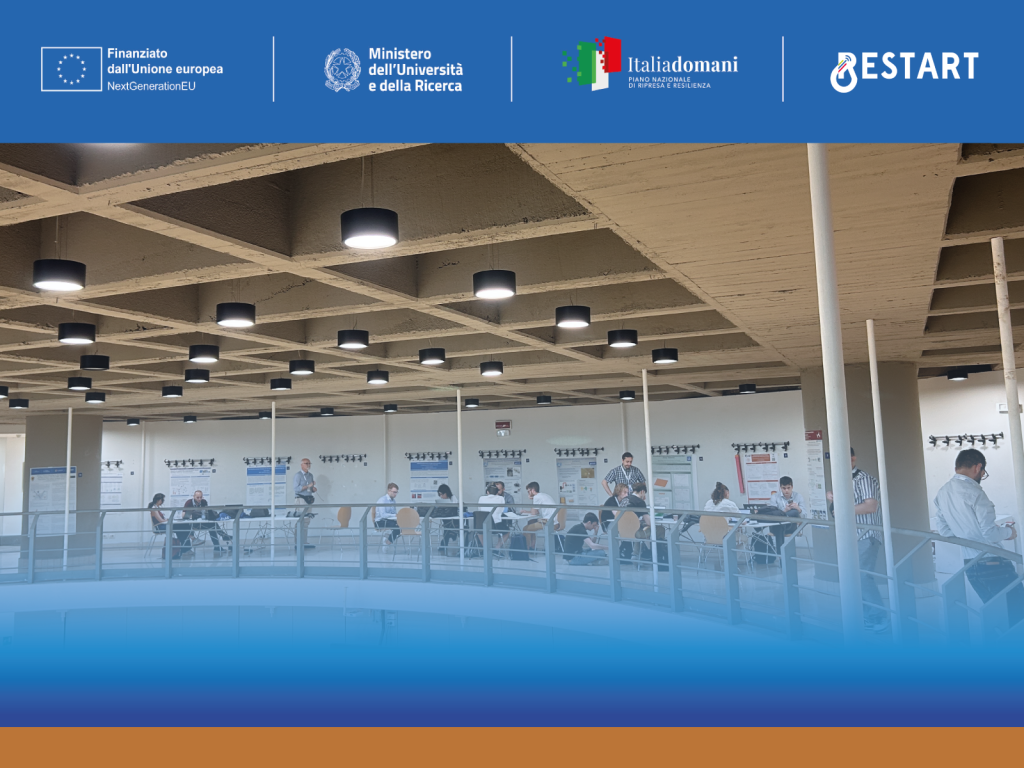RESTART fourth plenary meeting in Catania: from 25 to over 90 partners to project toward the future of Telecommunications in Italy

It was a fruitful two days, projected towards the future, to think not only about what has already been done, but also about what will be done and what continuity to give to the Program. Last July 4-5, the community of RESTART – RESearch and innovation on future Telecommunications systems and networks, to make Italy more smART – gathered at the Plenary Dissemination Workshop, hosted by the University of Catania, the coordinating entity of Spoke 6 – Innovative Architectures and Extreme Environments.
About 250 participants attended the packed program of activities, organized to coincide with the “midterm,” to take stock at the halfway point. The research and development program – funded by the European Union, NextGenerationEU, under the PNRR – has indeed reached the halfway mark, having now passed a year and a half since its inception.
The two-day workshop was opened by institutional greetings from the host institution, involving Professor Sergio Palazzo, coordinator of RESTART’s Spoke 6, and the Magnifico Rettore of the University of Catania Francesco Priolo. Following this, again as part of the introductory talks, the floor was passed to Dr. Fabrizio Cobis, Single Procedure Manager, representing the MUR. The last part of the greetings was, instead, by Dr. Marco Rendina, representative of Asstel, the association that in the Confindustria system represents all the companies in the Telecommunications supply chain, with which the RESTART Foundation has recently signed a Memorandum of Understanding, to initiate collaborative activities in order to promote progress in the sector.
11 sessions, each opened by keynote speeches and concluded by interesting talks, provided an overview of the results that RESTART’s 32 projects (14 structural, 18 focused) are achieving. The overview shows a research trend that is confirmed to be “on track” and a program that continues to grow, including at the level of those involved: the original 25 partners (now 26, following the demerger of one of the Partnership’s companies) have been joined by 67 thanks to the cascading calls mechanism, for a total of 93 entities and institutions currently involved. In fact, the first round of cascade calls is almost completed for a total aggregate amount of about 28 million euros, which has allowed an additional 30 universities, 1 foundation and 36 enterprises to join the Program. A second round of cascade calls is also planned for the coming months, aimed especially at small and medium-sized enterprises, start-ups and spin-offs.
The many partners that have arrived through the cascading calls are bringing a new wave of energy to the Program and the research being conducted, increasingly stimulating the level of collaboration between entities of different natures. In this context, RESTART is working to create a picture of what the future of telecommunications will look like, not only from a technological point of view, but also – given the importance of the latter – from an economic and value chain perspective. A collaboration that is not limited to the relationship only between the entities involved in each project, but also extends beyond them, thanks to targeted actions, such as the Grand Challenges, designed to stimulate inter-project research, not only between projects pertaining to RESTART, but also with other European Programs, thus crossing the national border.
The workshop was, in addition, an opportunity to bring together representatives of some of the companies and operators active on the Italian territory and part of the RESTART program, with the aim of discussing together, within two interesting panels, the future of communication technologies and network architecture.
As on previous occasions, there was no shortage of stimulating competition: Poster & Demo sessions were held in parallel with the program sessions, which led to the election of a “Best Poster & Demo,” voted on by the community of participants. Winning the award was the poster entitled. “Coherent: introducing a reference architecture for digital twin networks”, result of the work of Simona Rossitto, Salvatore Quattropani, Carmelo Ricci, Marco Becattini, Leonardo Paroli, Leonardo Scommegna, Lucia Pintor, Giancarlo Sciddurlo, Federica de Trizio e Luigi Rachiele.

Poster & Demo Session
An awarding committee was, on the other hand, set up to evaluate the Best Scientific Contribution and the Best Impact Contribution, choosing from a shortlist of contributions presented in public in the form of a pitch; this initiative allowed special attention to be paid to the young men and women researchers who work daily on the success of the Program. “The cost of learning dilemma” by Federico Mason (Università degli Studi di Padova) was awarded the Best Scientific Contribution, while the Best Impact Contribution went to Francesco Mancini e Giuseppe Bianchi of Università di Roma “Tor Vergata” for their work titled “ScasDK – A Development Kit for Security Assurance test in Multi-Network-Function 5G”.
Relive the highlights of the two-day workshop:
“This meeting of all the components of RESTART marks roughly the halfway point of the Program, so it is an important moment. I am very pleased with what we have seen over the past few days, starting with the attendance: in fact, we had about 250 people. The presentations we attended show that the projects are doing very well, with significant and outstanding results. However, the program is also made up of missions, and we still need to work on these, which are also activities intended to have an impact. There is still a way to go, but we now have a solid foundation.”
-Nicola Blefari Melazzi, RESTART Foundation President
“This Plenary Dissemination Workshop was an opportunity to try to give content that looks at the midterm results with a perspective that can collectively look at the kind of future scenarios that these results are building. We worked together with academic and industry partners to try to highlight the most promising results, i.e., those that can have the strongest impact in the field. The impression we have is that the vision is a coherent vision, not only based on the scientific interest of the researchers working inside RESTART, but also supported by the industrial interest that revolves around the results we are getting. I think it’s critical to see these two visions aligned and to notice growing industrial interest also in the demonstrators, the PoCs built by the projects, the new emerging ideas, the patents submitted, and the activities planned for the second part of the project.”
-Antonio Capone, RESTART Foundation Vice-President and Scientific Coordinator of the Program
“With great satisfaction we have reached the fourth Plenary of our Program. The community has expanded considerably: from the original 26 partners, we have now grown to an impressive 93. We have now added 67 partners, including universities, foundations and small, medium and large enterprises, which are a very important asset for us. We have already funded projects worth nearly 28 million euros and are about to launch a second round of cascade calls dedicated to start-ups, spin-offs and Innovative SMEs, through which we will fund projects and innovative business ideas for an additional four and a half million euros.”
-Adele Del Bello, RESTART Foundation General Director
“This is an important moment for the RESTART program because we are at the midterm, which is halfway through the project’s duration. As a local organizer, together with colleagues from the University of Catania and Spoke 6 of RESTART, I am proud to have been chosen for this initiative. It was an event that surprised even us by the high number of colleagues who attended, although it was legitimate to expect a large participation, also taking into account the fact that the original RESTART partners have now been joined by all the partners of the chordates that won the cascading calls. More than 250 participants, who were able to attend a very dense scientific program, in which there was room for speeches capable of showing the state of the art of the various projects and stimulating panels. One of the most interesting things was the session devoted to posters and demos and the fact that it was organized competitively. Not only did this provide the natural visibility for participation from a scientific point of view, but it also gave horizons to young researchers, who in some ways are being given special attention by the RESTART program and the PNRR programs in general. All PNRR programs should be primarily seen as an opportunity to give momentum and especially to make sure that what is being done in these three years can be followed up in stable terms.”
-Sergio Palazzo, RESTART Spoke 6 Coordinator
